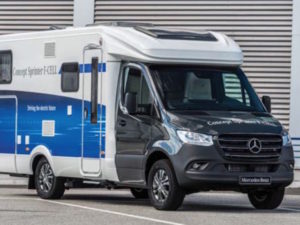Mercedes-Benz Vans has unveiled its Sprinter F-Cell concept, showcasing how its fuel cell technology could work in a commercial vehicle application.

Using a motorhome as a base, the F-Cell concept complements the new eVito and eSprinter vans, which will arrive in the UK in 2019, and uses a compact hydrogen fuel cell, designed to fit in the standard engine bay.
The fuel cell stack has 412 cells creating 75kW of power, which is passed through an inverter to an underfloor battery pack, similar to those used in the new eVito and eSprinter.
The 105kW battery, which can be wall charged for plug‐in use, drives an electric motor through a transmission integrated into the rear axle of the van, delivering 147kW and 350Nm of torque.
Hydrogen is stored in four modular pressurised tanks, three beneath the van floor and a fourth in the rear of the van. The underfloor tanks carry 4.5kg of hydrogen at 700bar, with the rear tank holding a further 2.9kg. This is enough to provide up to 310 miles of driving range, with the battery delivering a further 18 miles of pure electric drive.
Mercedes says the fuel cell driveline would suit van operators looking for electric drive with longer, inter‐urban range. The fuel cell driveline adds just 200kg to the weight of the van chassis when compared to a diesel driveline, making it particularly suitable for van use. As a high payload can be maintained.
No further details are available yet but head of Mercedes‐Benz Vans Volker Mornhinweg said: “We will offer every commercial range with an electric drive, starting with eVito and eSprinter. With these we will already cover many, but not all cases with a zero‐local‐emission powertrain. We are enhancing our strategy with fuel‐cell drive, which offers substantial medium‐term opportunities, especially in long distance operation.”

